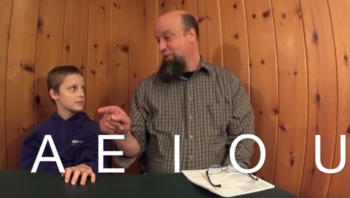Two pitfalls for three Esperanto tenses Posted by Tomaso on Apr 23, 2018 in Esperanto Language
In Esperanto the vowels tell time
When expressing ideas in a new language, you’re going to want to be able to indicate when something happened. This is called “tense.” Esperanto has three tenses – present, past, and future. This sounds pretty simple, but there are a few pitfalls to avoid. If you’re just starting out with Esperanto, this blog post will have some basic information for you, and if you’re approaching intermediate level, you may find some useful tips as well.
Present tense -as (now)
The present tense is used to indicate events that are happening now, or that happen on a regular basis.
- Mi kantas. I am singing (now) or I sing (regular basis.)
Past tense -is
The past tense is used to talk about an event which happened in the past and has been completed or has stopped.
- Mi kantis hodiaŭ matene . I was singing this morning.
- Mi kantis kiam mi estis juna. I used to sing when I was young.
Future tense -os
The future tense expresses the idea that something isn’t happening now but will happen in the future.
- Mi kantos morgaŭ vespere. I will be singing tomorrow evening.
Pronunciation matters
The tense system above sounds simple enough, but take care to work on your pronunciation. These endings carry a lot of information but are found in an unaccented syllable at the end of a word. English speakers are especially prone to turning unaccented syllables into an indistinct “schwa sound”. This is especially true with –as and –is. The A should be a clear “A as in father” and the I should be a clear “I as in machine”. Please see this video where I demonstrate the vowel sounds in Esperanto.
In order to be sure that people will understand what you’re saying make sure to pronounce these clearly. If your –as sounds like the last two letters of the English word “canvas” or your -is rhymes with “miss” or “kiss”, you’re doing it wrong. I meet a lot of post-beginner speakers who make this mistake and it makes it very difficult to understand what they’re trying to say. (Wait, did you go already or are you going to go now?) Here is a second video where I show how to pronounce -as, -is, and -os.
Did I mention that it’s important to clearly pronounce the endings on your verbs?
The present is now, the future is then
Another pitfall – slightly less confusing to your listener than the previous one, but still worth paying attention to – is the tendency to use the present tense to describe future events. In English we can get away with saying “I am going there tomorrow” – but in Esperanto, if we’re talking about something which will happen tomorrow, we need to use future tense.
- Mi iros tien morgaŭ. I am going there tomorrow. (I will go.)
- Je kioma horo komenciĝos la interkona vespero? When does the meet-and-greet start? (When will it start.)
Notice that we use the –os ending, even though we can use present tense in English. This is because we’re talking about a scheduled event in the future and the rules for those are different in English and Esperanto. It will take practice to get used to using the future tense here, but it’s the correct tense to use in Esperanto because we’re talking about events which will be happening in the future.

Build vocabulary, practice pronunciation, and more with Transparent Language Online. Available anytime, anywhere, on any device.





Comments:
serge strickles:
Saluton al cxiuj,
Dankon al vi por vian laborojn.
Sergio al Belgio.